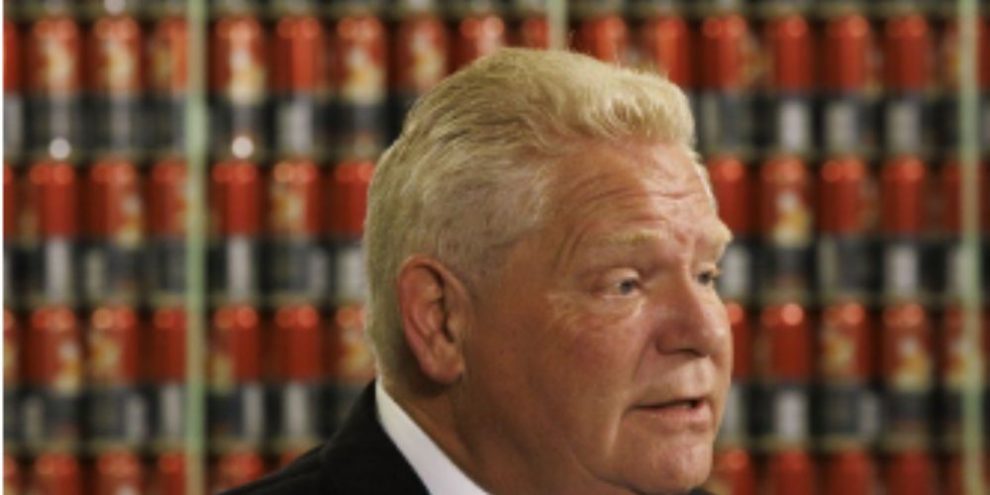
Very few Ontario grocery stores that are required to accept empty alcohol containers are doing so, leaving the future of the deposit return program in question as The Beer Store closes locations across the province.
About 70 grocery stores — ones that are more than five kilometres away from a Beer Store — have been required to take empties since last fall. But only 13 are complying, according to the Ministry of Finance. The Beer Store, which operates the deposit return system, says just four of those have arrangements with it for returns, while the government says the others have private arrangements.
On Jan. 1, 2026, all grocery stores selling beer and wine — more than 1,000 are licensed, according to the Alcohol and Gaming Commission of Ontario — will have to accept bottle returns as part of Premier Doug Ford's move to speed up the availability of alcohol.
Barrie's News Delivered To Your Inbox
By submitting this form, you are consenting to receive marketing emails from: Central Ontario Broadcasting, 431 Huronia Rd, Barrie, Ontario, CA, https://www.cobroadcasting.com. You can revoke your consent to receive emails at any time by using the SafeUnsubscribe® link, found at the bottom of every email. Emails are serviced by Constant Contact
The Ministry of Finance says the rest of the approximately 70 with current obligations are "expected to join over the coming months."
But Jan. 1 is also when The Beer Store is allowed under Ford's alcohol agreement to close an unlimited number of stores, and with so few grocery stores already participating and others threatening to hand back their licences rather than participate in the deposit return program as currently structured, the program that saw 1.6 billion containers returned last year could be in jeopardy.
Karen Wirsig, a senior program manager at Environmental Defence, said the program allows for beer bottles to be reused, ensures the effective recycling of most alcohol packaging and keeps millions of tonnes of material out of landfills.
"As the Beer Stores keep closing, that will kill the Ontario deposit return program," she said. "If you don't make returns convenient for people, they won't do it."
John Nock, president of the union representing The Beer Store employees, said there should be some enforcement to ensure the grocery stores get deposit return systems up and running so consumers can get their 10 or 20 cents per container.
"If they're allowed to sell alcohol ... they should take returns," he said.
"Why are (we), the public, paying a deposit to the government that we can never get back? Or we've got to drive a half an hour (to the nearest Beer Store) to get our $2 or $3 back."
Grocery stores have for months voiced their concerns with the program, from sanitation issues and space constraints to a sheer cost effectiveness calculation. Earlier this month associations representing both small and large grocers wrote a joint letter to the premier warning they will stop selling alcohol if the program isn't improved.
"Unless urgent changes are made to build fairer economics and to move away from a mandatory return-to-retail recycling system, our grocery members have advised that their stores will start the process of reviewing their future participation, potentially exiting the category all together," wrote the Retail Council of Canada and the Canadian Federation of Independent Grocers.
Adding insult to injury, they say, is a move by the government in its budget to increase a wholesale alcohol discount from 10 to 15 per cent for bars, restaurants and convenience stores — who do not have to accept empties — but not grocery stores, who do.
"It's inexplicable," said Gary Sands, senior vice-president of public policy and advocacy with the Canadian Federation of Independent Grocers.
"If anything, what they should have been doing is saying, 'In light of the fact that we've dumped all the recycling on you guys, we're going to increase your allowance and we'll leave the others as it is.' Instead, it's the reverse."
It puts grocery stores at a competitive disadvantage, Sands said.
"(Ford) promised us that when he rolled out the new system, there would be no winners and losers," he said. "He's broken that promise."
The big grocery chains, through the Retail Council of Canada, are echoing those concerns. Loblaws is testing a return-to-retail system at one location and is finding it's "ludicrously expensive," said Sebastian Prins, director of government relations for the retail council.
"It's tightening already tight margins," he said. "Our folks just want to be able to kind of compete on a level playing field."
The AGCO has started sending grocers some "compliance letters," Prins said, but the language is fairly soft for the time being.
There are many steps the government could take to help enable grocers to offer return systems, Prins said, such as looking at removing the deposit from beer cans and leaving those to the blue box system.
"Even something as simple as the government saying, 'We are going to convene major grocers and The Beer Store in a room to talk about is there a cheaper mouse trap that can be built here' — even that would be seen as forward progress," he said.
"They've kind of got all their levers pushed to zero."
Ford's previous plan was to get beer, wine and ready-to-drink cocktails in convenience stores and all grocery stores by 2026, but in May of 2024 he announced that would instead happen that year.
An “early implementation agreement” with The Beer Store involves the province paying the company up to $225 million to help it keep stores open and workers employed.
The province's financial accountability officer said there will also be a $215-million cost as a result of lower tax revenues as grocery, big box and convenience stores are not subject to beer, wine and spirit taxes.
As well, the FAO said there will be $172 million in lower net income to the Liquor Control Board of Ontario. While there will be a $1.1 billion increase in wholesale LCBO revenue, there will also be an approximately $812 million decline in LCBO retail revenue, a $192 million cost to give wholesale discounts to new retailers, $150 million in service rebates to brewers, $105 million in higher operating expenses, and $22 million in higher recycling fees.
Under the agreement, The Beer Store has to keep at least 300 stores open up to the end of this year, but starting in 2026 there is no minimum number.
Ozzie Ahmed, vice-president of retail for The Beer Store, said in a statement that the stewardship of alcohol containers is an important part of retailer responsibility.
"Annually The Beer Store processes about 1.6 billion alcohol containers, more than we sell in our own network of stores," Ahmed wrote.
"This diverts waste from landfills, recycling facilities and ensures consumers have an easy and convenient way to get their deposit back."
This report by The Canadian Press was first published May 30, 2025.





